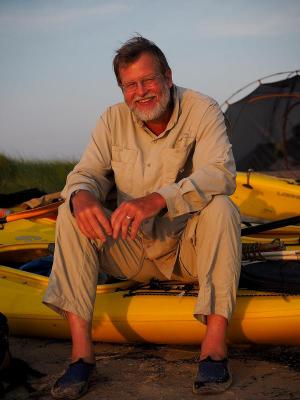Bill Nelson joins The Jefferson School as environmental education coordinator
One of the main things that drew Connie Hendricks to the headship of The Jefferson School in 2009 was the potential of transforming the 43-acre campus into a vibrant, hands-on, outdoor learning environment.
Hendricks’ vision is rooted in her own childhood learning experiences. “When I was growing up I loved learning, but I hated school. Each subject was presented in its silo, isolated from the other subjects. Since no one explained how class lessons and homework applied to the real world, it just felt like a boring, tedious cycle of pointless memorization and regurgitation,” she said. “My most cherished memories of learning are field trips to museums and days spent outside being able to explore and touch things, sparking questions that led to other questions that begged an answer.” Her early hands-on experiences led to a career in teaching and a firm belief that experiential education is the key to igniting a passion for lifelong learning.
Nine years later, on any given day, TJS students from preschool to eighth grade can be found studying the aquatic life in one of the school’s two ponds, and observing the birds and insects that visit the schoolyard habitats. Recess activities include taking care of the school’s goats, chickens and bees, or building forts and creative play areas.
However, despite the strides made toward creating the one-of-a-kind, nature-centered educational experiences for which the school is quickly becoming known, the ongoing frustration was that any new initiatives meant adding responsibilities to the teachers’ already bulging to-do lists. How could a small school more fully develop the resources of this ecological jewel of a campus and help teachers think expansively and creatively about using these spaces as part of the daily classroom experience? And how could staff incorporate ideas from the fertile, inquisitive minds of their students in the process?
This is where Bill Nelson, TJS’s environmental education coordinator, comes in. With a degree in biology from Tufts, Nelson earned his teaching certificate from the University of Alaska, Fairbanks and a master of science degree in writing for the sciences from Towson University. His career path included teaching at the American School in Japan, Sidwell Friends in Washington, D.C., and Bryn Mawr School in Baltimore before landing at TJS in 2009. He taught middle school language arts and science at TJS for a year before answering a call from Salisbury University to join its environmental studies department.
When Hendricks launched the Science Saturday program, she reached out to Nelson, who used the event as an opportunity for his students to develop hands-on experiences, including building bee boxes, making peanut butter and grinding grain by hand. The Science Saturday collaboration led to conversations about Hendricks’ vision for the TJS campus. As the brainstorming evolved into adding the position of environmental education coordinator to the faculty, Nelson was the obvious choice to implement the three-pronged goals:
• Develop the natural infrastructure of the school's 43 acres to make it more user-friendly
• Serve as a resource for students and teachers to further incorporate the campus into the daily learning experience
• Collaborate with other organizations to engage speakers, develop field trips and pursue grant opportunities related to the program.
With his passion for the outdoors and his friendly, laid-back manner, Nelson has quickly settled back into the TJS community. Since returning to TJS, he set up shop in his outdoor “office,” a small RV trailer that holds all kinds of curious gear, from a home-made solar cooker to materials for a pop-up outdoor classroom. He also has collaborated with the teachers on augmenting their lesson plans and worked with students to implement ideas they have for developing the campus.
“My work at TJS since September has been about spontaneity and flexibility,” he said. “Working as a collaborative resource for the faculty, rather than having specific classes to teach, allows a stronger connectedness with the teachers, and focused interaction with the students and their families.”
These interactions have taken a variety of interesting turns so far this year. In late September, Nelson, teacher Amy Campagnone, and the Delmarva Astronomy Society arranged a sky and moth night for families. Early November marked the first of a series of semiannual family overnight campouts on campus, and in early February, Nelson led families on a cabin-fever hike through Redden State Forest. Future planned activities include Saturday kayaking excursions and a parent-child challenge race in collaboration with coach Nancy Berg and inspired by “The Amazing Race.”
A recent and somewhat unusual addition to the campus is the Road Kill Café, a discreetly placed carrion feeding area, allowing interested students the opportunity to observe the decomposition process at various stages.
As he settles into his new role, Nelson plans to develop a master plan for the campus and enrichment excursions to places like Echo Hill Outdoor School on Maryland’s Eastern Shore and Blackwater National Wildlife Refuge in Milton. With enthusiastic input from both teachers and students, a list of exciting possibilities is emerging to develop this part of the curriculum.
“I’ve found that when you teach kids what you really care about, they will think it is cool and become engaged as well,” said Nelson. “It’s a wonderful job to have at this stage in my working career.” In Bill Nelson’s capable hands, Connie Hendricks’ vibrant, experiential, nature-centered vision appears poised to thrive.

























































